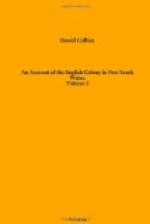Thus already did the settlement and the public at large derive some advantage from the fishing on the coast, by the discovery of this shoal.
There happened three deaths in this month which were out of the common way: a woman at the Hawkesbury died of the bite of a snake; another woman was drowned in attempting to land at Norfolk island; and on the 19th died, very suddenly, Mr. Stephenson, the store-keeper at Sydney. As his death was not exactly in the common way, so neither had been the latter part of his life; indeed, all that part of it which he had passed in this country; for, by an upright conduct, and a faithful discharge of the duties of the office with which he had been entrusted, he secured to himself the approbation of his superiors while living, and their good name at his death.
Stephenson had been emancipated for his orderly behaviour, and to enable him to execute the office of store-keeper.
The annual election of constables recurring about this time, the magistrates were desired to be very particular in their selection of the persons returned to them for that purpose; as there was reason to fear, from the frequent escapes of prisoners from the different gaols, that the constables had been tampered with, so shamefully to neglect their duty.
The wheat harvest being over, and the country, as happened generally at this season of the year, every where on fire, those who were engaged in farming were reminded of the necessity of their exerting themselves by every practicable means to secure their crops, when stacked, against accident by fire. As yet, none had been heard of. In the early part of the month Farenheit’s thermometer at the Hawkesbury stood at 107 degrees in the shade.
Many people were at this time much afflicted with inflammations of the eyes*, attended with extreme pain, and supposed by the medical gentlemen to be occasioned by the excessive dry and sultry weather which had prevailed for a considerable time. Dysenteric complaints were also very common, which were attributed to the water, most of the runs and springs having been nearly dried up. The tanks which were cut in the rocks below the stream by order of Governor Phillip had proved of infinite utility.
[* In the month of April 1794 and 1796, several adults and children were troubled with an inflammation of the eyes, which was then attributed to the variable and unsettled weather that had for some time prevailed. It must be remarked, that the present appearance of this complaint was in the summer, the former in the winter season.]




